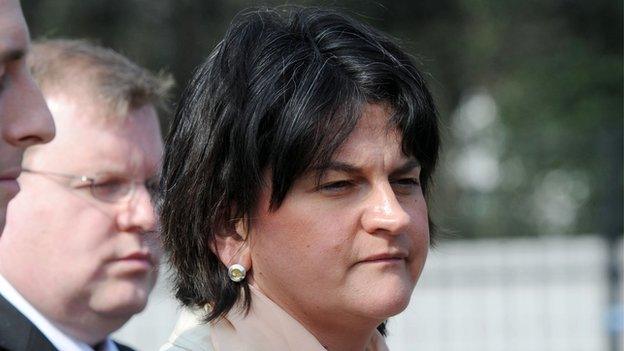Welfare reform: leaked document outlines financial crisis facing executive
- Published
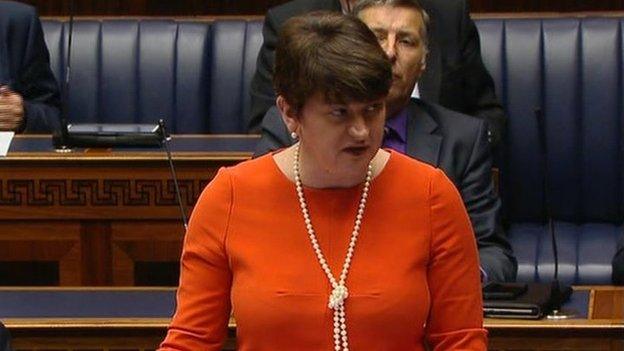
Arlene Foster said failure to agree welfare reform could mean a senior civil servant having to introduce cuts across all departments
The BBC has seen a document in which Finance Minister Arlene Foster outlines the financial crisis facing the Northern Ireland Executive.
Her paper, obtained by the Nolan Show, has been circulated to other executive ministers.
In it, she said no deal on welfare would mean the executive having to make cuts of £604m in order to balance its books.
Mrs Foster said health could lose £280m and education £114m.
Bleaker picture
A so-called black hole would be created because loans offered in the Stormont House Agreement depend on the welfare issue being resolved.
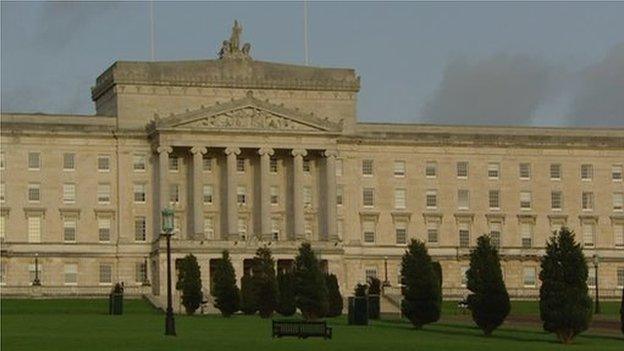
Stormont's spending environment is ultimately determined by the UK Treasury - 95% of the devolved administration's budget is the block grant awarded by Westminster
There are no indications, however, if she would be prepared to bring this level of cuts forward.
The paper also presents an even bleaker picture in the absence of any budget being agreed and passed by July.
Then the permanent secretary of the Department of Finance would take control.
Mrs Foster, in her paper, stated that under legislation, income received such as planning fees and EU farm payments could not be spent.
She said this would leave Stormont facing a £2.8bn shortfall.

Analysis
John Campbell, BBC News NI Economics and Business Editor
This memo increases the pressure on other parties ahead of the proposed vote on welfare reform.
It sketches out a worst case scenario for the budget if there is no agreement - what we might call Arlene Foster's nuclear option.
The big number is a £2.8bn cut which the minister says would have to be imposed if civil servants took control of the budget.
In cash terms that would mean slashing the budget by about 20% which would have a grave impact on public services.

Agriculture Minister Michelle O'Neill later released a statement saying that farmers' subsidy payments were safe.
The Sinn Féin minister said the application window closed last Friday and there was a "firm contractual obligation on government to make these payments", which were funded "ultimately from the European Commission", to the 27,000 farmers who had applied.
Regional Development Minister Danny Kennedy said he would have to reflect on his position if the deadlock over welfare reform is not resolved by next Tuesday.
'Collapse of the system"
Speaking after the five Executive parties met the Secretary of State Theresa Villiers at Stormont House on Thursday morning, Mr Kennedy warned that the institutions were in a "very perilous state".
"I don't find the prospect of presiding over a zombie department in any way appetising," he said.
Health minister Simon Hamilton said the DUP had been warning for "weeks if not months" that not moving on welfare reform would have a "devastating impact" on the budget of all the departments.
"Put simply, nearly £300m being taken out of health and social care in Northern Ireland will lead to the collapse of the system," he added.
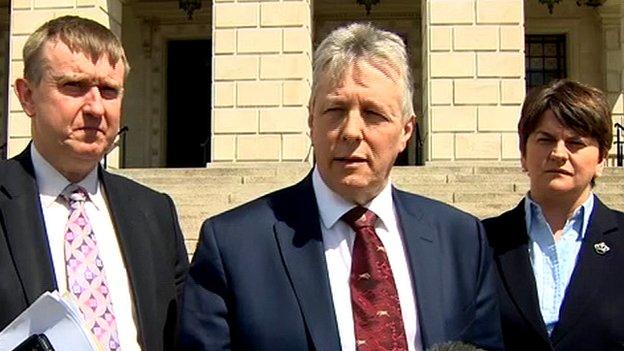
First Minister Peter Robinson, centre, with Social Development Minister Mervyn Storey and Finance Minister Arlene Foster, said on Wednesday that Northern Ireland would face massive cuts if welfare reform was not agreed
Northern Ireland's politicians are due to debate the welfare reform bill in the assembly next week.
Sinn Féin has said it will ask other parties to back a petition of concern against the bill. The SDLP has refused to say whether it would support that.
The main Stormont parties held talks with Ms Villiers on Wednesday but failed to produce any sign of a resolution to the continuing deadlock over the budget and welfare reform.
The Northern Ireland parties had agreed a deal on Westminster's welfare reform in the Stormont House Agreement last December.
However, Sinn Féin withdrew its support for the bill in March.
- Published21 May 2015
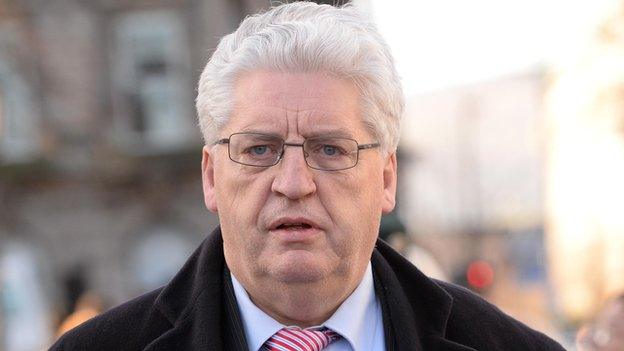
- Published20 May 2015
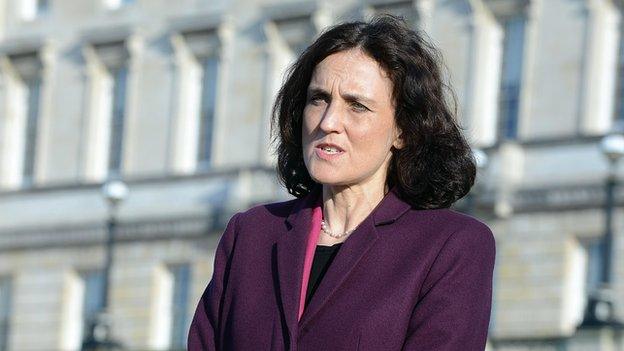
- Published19 May 2015
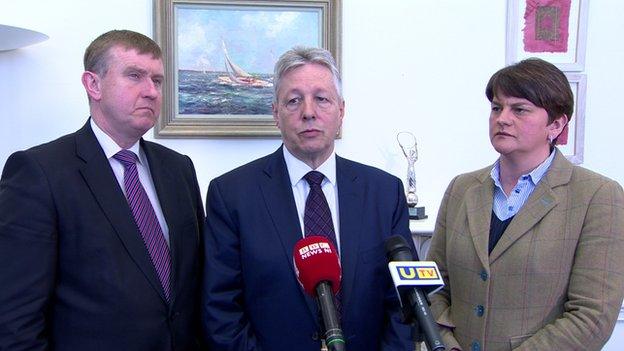
- Published18 May 2015
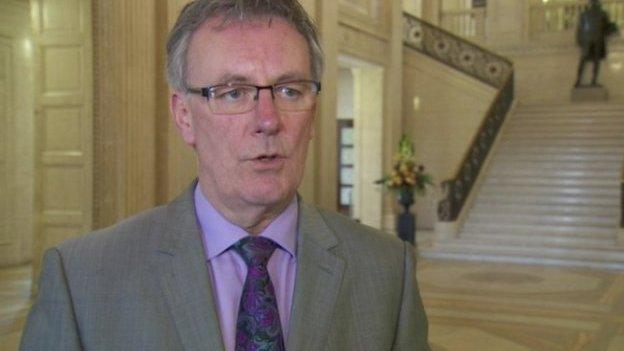
- Published29 August 2014
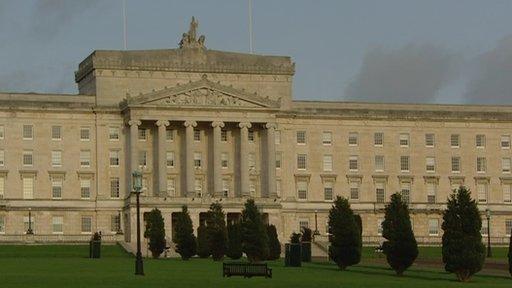
- Published13 May 2015
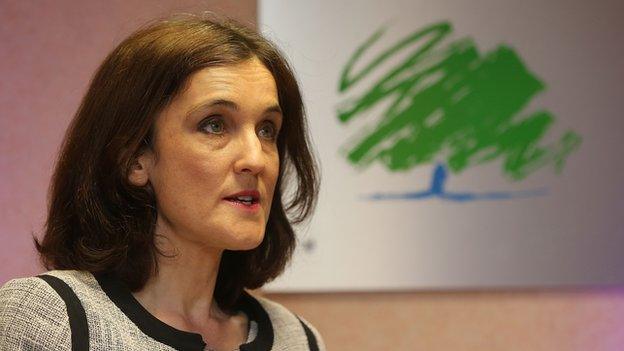
- Published12 May 2015
